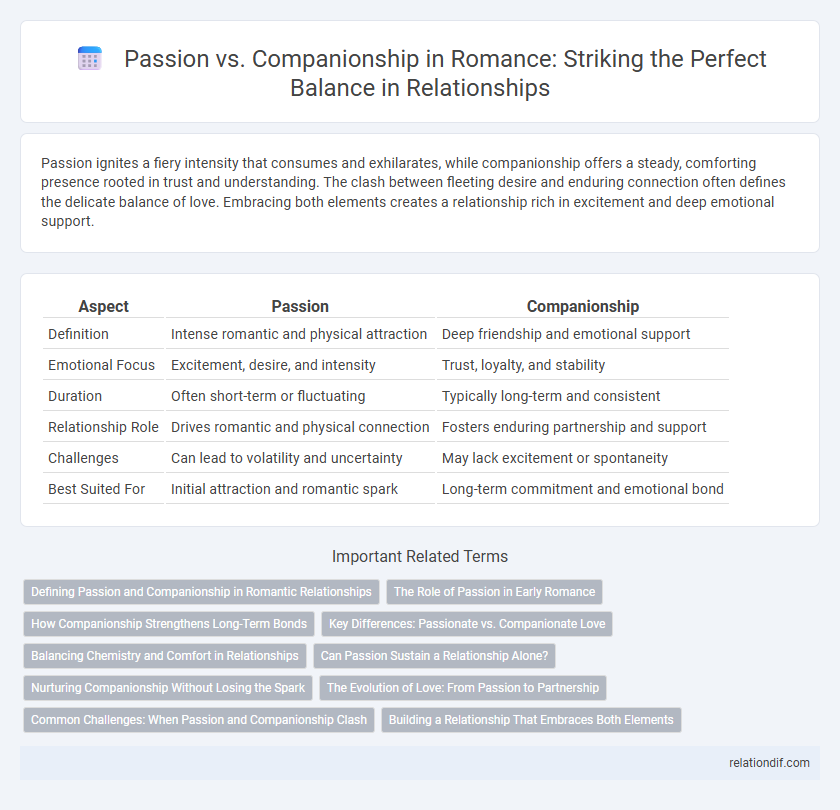Passion ignites a fiery intensity that consumes and exhilarates, while companionship offers a steady, comforting presence rooted in trust and understanding. The clash between fleeting desire and enduring connection often defines the delicate balance of love. Embracing both elements creates a relationship rich in excitement and deep emotional support.
Table of Comparison
| Aspect | Passion | Companionship |
|---|---|---|
| Definition | Intense romantic and physical attraction | Deep friendship and emotional support |
| Emotional Focus | Excitement, desire, and intensity | Trust, loyalty, and stability |
| Duration | Often short-term or fluctuating | Typically long-term and consistent |
| Relationship Role | Drives romantic and physical connection | Fosters enduring partnership and support |
| Challenges | Can lead to volatility and uncertainty | May lack excitement or spontaneity |
| Best Suited For | Initial attraction and romantic spark | Long-term commitment and emotional bond |
Defining Passion and Companionship in Romantic Relationships
Passion in romantic relationships is defined by intense emotional and physical attraction, often marked by desire, excitement, and a strong yearning for intimacy. Companionship centers on deep friendship, mutual support, and shared life experiences, providing stability and emotional security. Understanding the balance between passion's fervor and companionship's steady bond is essential for nurturing a lasting, fulfilling partnership.
The Role of Passion in Early Romance
Passion in early romance ignites intense emotional and physical attraction, driving couples to form deep, immediate connections. This initial spark fuels desire and excitement, often overshadowing the foundation of companionship that develops over time. Understanding passion's powerful influence helps explain why many relationships begin with fervor before evolving into lasting partnerships grounded in mutual support and friendship.
How Companionship Strengthens Long-Term Bonds
Companionship strengthens long-term romantic bonds by fostering mutual understanding, trust, and shared experiences that evolve beyond initial passion. Emotional support and consistent presence create a stable foundation, allowing love to deepen and endure the challenges of time. Couples who prioritize companionship often experience greater relationship satisfaction and resilience compared to those focused solely on passion.
Key Differences: Passionate vs. Companionate Love
Passionate love ignites intense emotions, physical attraction, and a desire for closeness, often characterized by excitement and urgency. Companionate love centers on deep affection, trust, and a strong bond built through shared experiences and mutual respect over time. Key differences include the intensity of feelings and the longevity of connection, with passion typically fluctuating and companionship providing stable, enduring support.
Balancing Chemistry and Comfort in Relationships
Passion ignites intense chemistry that fuels desire, while companionship fosters deep comfort and trust necessary for lasting bonds. Balancing these elements requires nurturing both emotional intimacy and physical attraction to create a harmonious relationship. Couples who prioritize open communication and mutual respect effectively blend passion with comfort, enhancing relational satisfaction.
Can Passion Sustain a Relationship Alone?
Passion ignites intense emotions and physical attraction, but sustaining a relationship requires the stability of companionship built on trust, communication, and shared values. Studies show couples relying solely on passion often face challenges as the initial intensity fades within months to a few years. Long-term relationship satisfaction correlates more strongly with emotional intimacy and mutual support than with passion alone.
Nurturing Companionship Without Losing the Spark
Nurturing companionship in a romantic relationship requires intentional effort to maintain emotional intimacy while preserving the excitement of passion. Regular communication, shared experiences, and mutual support deepen connection, creating a strong foundation where affection can continue to flourish. Balancing comfort with spontaneity ensures the relationship remains vibrant, blending trust with the thrill of new discoveries.
The Evolution of Love: From Passion to Partnership
The evolution of love often transitions from intense passion to deep companionship, reflecting a shift in emotional priorities. Neuroscientific studies reveal that early-stage romance activates the brain's reward system, while long-term partnerships engage areas linked to attachment and trust. Understanding this progression highlights how enduring relationships balance desire with mutual support, creating a sustainable bond.
Common Challenges: When Passion and Companionship Clash
Navigating the tension between passion and companionship often leads to misunderstandings and emotional distance in romantic relationships. Couples frequently struggle to balance the intense desire for passion with the steady comfort of companionship, resulting in conflicting expectations and dissatisfaction. Addressing these challenges requires open communication and a willingness to adapt to evolving emotional needs without sacrificing intimacy or mutual respect.
Building a Relationship That Embraces Both Elements
A thriving romantic relationship balances intense passion with deep companionship, creating a foundation of trust and emotional intimacy. Cultivating both physical desire and mutual respect strengthens the bond, allowing partners to grow together. Prioritizing open communication and shared experiences fosters a connection that embraces the excitement of passion alongside the comfort of companionship.
passion vs companionship Infographic

 relationdif.com
relationdif.com